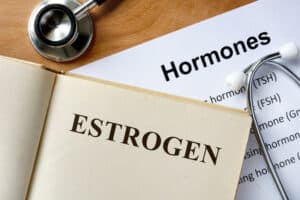 Anxious or Irritable? It Could be Too Much Estrogen. Do you feel anxious, angry, irritable, impatient, bloated, fat and short tempered? It could be too much estrogen!
Anxious or Irritable? It Could be Too Much Estrogen. Do you feel anxious, angry, irritable, impatient, bloated, fat and short tempered? It could be too much estrogen!
Estrogen is the hormone of energy and growth. It makes a woman a woman and it is essential to men for memory. Women get full breasts, curves and it is responsible for the uterine lining growing every month. However too much estrogen can cause:
- Growth of breast and ovarian cysts
- Fibroids
- A thick uterine lining.
Too much estrogen in relation to progesterone causes:
- Heavy and or irregular period
- Menstrual migraine
- Post partum depression
- Weight gain
Too much estrogen in a man will cause:
- Breast enlargement
- Fat bellies
- Listlessness
- Loss of ambition
Estrogen gives you energy, helps your brain function better, builds bones and lowers lipids. Too much estrogen will cause the symptoms mentioned above. It can also cause:
- Mood swings such anxiety, anger, irritability and impatience
- Insomnia
- PMS
Young women experience this mostly after ovulation when estrogen is at its peak and use the term PMS. Too much estrogen can result in:
- Fluid retention
- Bloating
- Weight gain
In the later years, during perimenopause it is really too much estrogen in relation to progesterone. Perimenopause,, which usually starts in the mid 40’s, but can start as early as in the mid to late 30’s, is also associated with the symptoms of too much estrogen even though estrogen levels are normal or low.
There may be the right amount of estrogen, however if you don’t have enough progesterone to counteract the effects, you may experience the symptoms of too much estrogen.
Treating the Symptoms of Too Much Estrogen
There are many environmental substances that act like estrogen and stimulate estrogen receptors. Your body thinks it is estrogen and responds as if exposed to too much estrogen. Avoiding these so called xenoestrogens can bring your hormones in balance and relieve the symptoms.
- Avoid BPA’s by not heating in plastic and eating out of cans.
- Choose hormone free, antibiotic free meat, dairy and poultry since they are given hormones to fatten them up and you will ingest what they have.
- Eat organic as much as possible. Herbicides and pesticides can act like estrogen. Since it may not be possible to eat everything organic, check the Environmental Working Group at ewg.org to learn which produce has the most amount of pesticides and eat those organic. These are called the dirty dozen.
- Avoid hormone disruptors in personal care products that contain parabens, phthalates, sodium laurel sulfate and other chemicals. A list of safe products is also on the Environmental working group website.
- Eat lots of soluble fiber found in berries, apples, pears, gluten free oat bran, beans and ground flax meal. This fiber helps to eliminate excess estrogen.
When it comes to hormones, every hormone has a counter hormone and progesterone counter balances estrogen. Progesterone makes you calm, relaxed, releases fluid retention and prevents excess growth of the breasts, the uterine lining and ovarian cysts. When all of the diet and lifestyle factors don’t relive the symptoms of too much estrogen, consider hormone replacement therapy with progesterone by a functional and anti aging medical doctor.





She is a recognized and award-winning holistic, functional, integrative and anti-aging healthcare practitioner, speaker and author, and has been featured in ABC News, Forbes, WOR Radio and many media outlets to spread the word that you can live younger and healthier at any age.